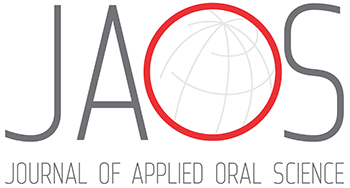OBJECTIVE: This study evaluated the effect of chemical polishing on the internal adaptation of complete denture bases fabricated with Veracril® resin and polymerized by either the conventional (C) or microwave (M) techniques. MATERIAL AND METHODS: Six groups (n=6/group) were tested: 1) C + no polishing (CO); 2) C + chemical polishing (CQ); 3) C + immersion in hot water at 75ºC (CW); 4) M + no polishing (MO); 5) M + chemical polishing (MQ); and 6) M + immersion in hot water at 75ºC (MW). Internal adaptation immediately after the polishing treatment and after 30 days of storage in water at 37ºC was evaluated by weighing a vinyl polysiloxane film reproducing the gap between resin base and metallic master model, using a precision scale. Data were analyzed by ANOVA and Tukey test and paired Student's t test, at a significance level of 0.05. RESULTS: No significant difference in immediate adaptation was found as a function of technique, polishing treatment, or interaction of technique/polishing. After 30 days, adaptation means (g) were: CO=2.46±0.32 a; CQ=3.40±0.23 d; CW=3.14±0.22 c; MO=3.23±0.37 c, d; MQ=3.41±0.47 d; MW=2.81±0.33 b (means followed by different letters are statistically different at alpha=0.05). All groups but group CO had significant increase of misfit over the tested period. CONCLUSION: The present results suggest that Veracril® resin denture bases submitted to chemical polishing had decrease of internal adaptation in 30 days, although immediate adaptation was not affected.
Acrylic resin; Chemical polishing; Complete dentures

